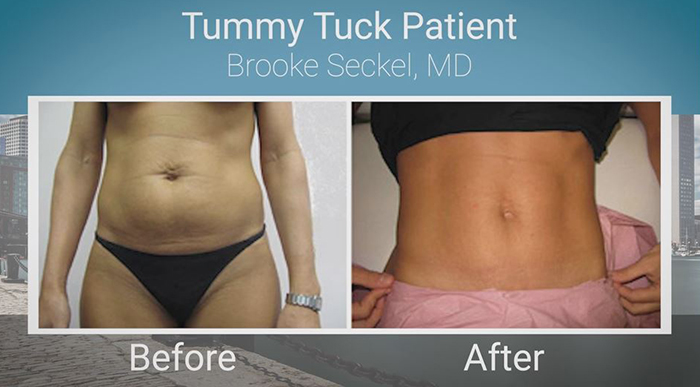The tummy tuck is a popular surgical procedure designed to restore a smooth, firm contour to a stretched out abdomen. Contrary to what many people think, it is not a weight loss procedure. In order to experience the best results from a tummy tuck, candidates should achieve their weight loss goals before undergoing surgery.
According to board certified plastic surgeon Dr. Brooke R. Seckel, most patients who want to have a tummy tuck really need to lose weight first. “The tummy tuck is not a weight loss technique. And that’s a common misconception,” begins Dr. Seckel. “All too often patients look at a before and after picture, and they say, ‘My goodness, I want a nice tight tummy,’ but they haven’t done the necessary before work.”
What is a Tummy Tuck?
Pregnancy and major weight loss can both lead to loose, saggy skin in the abdomen, as well as stretched out muscles below the skin. During a tummy tuck, excess skin is surgically removed and the abdominal muscles are restored to their proper pre-pregnancy position.
During a Tummy Tuck:
- Excess skin is removed
- Abdominal muscles are restored
- Smooth, firm abdominal contour is restored
As is the case with any surgical procedure, the trade-off for a restored abdomen is a scar. Tummy tucks, in particular, have very lengthy scars. “The key is to place the incision low,” explains Seckel. “I typically go just right above the pubic hair line.”
To achieve the best scar placement for his patients, Dr. Seckel encourages them to bring in a favorite bikini on the day of surgery. Using a surgical marker he outlines the bikini and places the incision below the outline. By doing this, he ensures that they will be able to hide the resulting scar when they are on the beach in their favorite bikini.
Proper Patient Selection
A tummy tuck, also known as an abdominoplasty, is not a small surgical procedure. Due to the extensive nature of the surgery, Dr. Seckel places a heavy emphasis on proper patient selection. Not everyone who wants a tummy tuck is a candidate for surgery. Patients who want to undergo a tummy tuck need to be physically healthy and at a stable weight that is at, or very near, their ideal body weight.
“The problem with patients who have not reached their ideal weight is that there is fat inside the abdomen, wrapped around the intestine, that causes the abdomen to protrude,” explains Seckel. “You can do the best tummy tuck in the world, but you’re not going to push that tummy back in. Patients who have a protruding tummy need to lose the proper weight first.”
There are two different types of fat residing in the abdomen. The fat that lives just below the skin is known as subcutaneous fat. This is the fat you can pinch around your waist. Deeper fat, the fat surrounding internal organs, is known as visceral fat. When a patient has excess visceral fat, no amount of skin or muscle tightening – nor liposuction – can achieve a flat abdomen.
“Only weight loss will correct that,” says Seckel. “I tell patients that I’d like them to lose proper weight through diet and exercise until they’ve lost that fat on the inside. They should only have an inch to an inch and a half of fat beneath the skin.”
Liposuction & Tummy Tuck
Many patients who have not reached their ideal weight want to know why the extra fat around the midsection cannot simply be removed with liposuction at the time of surgery. The truth is, many surgeons, including Dr. Seckel, do routinely combine liposuction with tummy tuck surgery. However, not all areas of the abdomen can be safely treated with liposuction during a tummy tuck.
“The problem when you’re doing a tummy tuck is, if you liposuction the middle portion of the abdomen you’re disrupting the blood supply to the skin,” explains Seckel. “Then, when you tighten that tummy, the skin does not have enough blood flow and you can loose skin down at the bottom of the incisions.”
When blood supply is compromised as a result of liposuction, wound healing complications occur. In the long run, these complications can lead to a lengthier recovery and additional scarring. By avoiding liposuction in the middle portion of the abdomen during a tummy tuck, Dr. Seckel is able to reduce the risk of complications after surgery.
It’s also incredibly important to understand that while liposuction is an amazing tool to remove subcutaneous fat, it is useless in combating visceral fat.
Better Preparation, Better Outcomes
Taking time to achieve and maintain your ideal body weight before surgery is an important step towards maximizing your results and minimizing your recovery. With the exceptions of an additional pregnancy or significant weight gain, the results should last for years to come.


















Facebook
Twitter
Instagram
YouTube
RSS